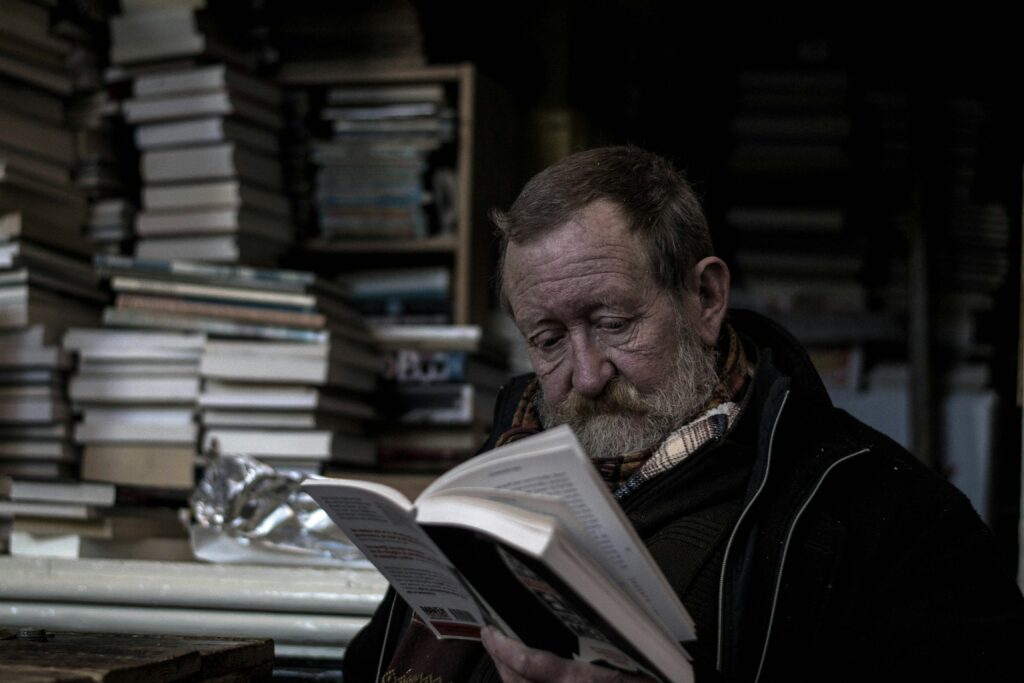My most memorable learning experiences: Why read

Unsplash, “Photo by Ben White on Unsplash.”
When I was young, my parents bought a World Encyclopedia set and added the children’s learning guides that went along with the set. These books were bought with the provided stand and sat prominently in our living room. When I was inside (which wasn’t as much as you might think) I would often open up these books and learn about the world. I would learn about politics, I learned about space, I learned about nature, and the ocean, among many other things. I found these guides and encyclopedias fascinating, and this has started my lifelong love of learning through reading. As I grew up, I had two examples in my family of people who read: my mother and my grandfather. These two people fostered my love of reading, and soon, I was reading multiple books sometimes even in a single night. I can remember running back to my grandparents’ bedroom to grab another book and running back to my bedroom and reading until all hours of the night. When I think back on my most memorable structured learning experiences, I can remember two distinct experiences. Both were quite similar in nature, and because they are similar I wonder if they speak to my learning style or my personality type. Both classes were atypical in nature and involved a large amount of reading during the majority of the class, or for homework.
The first memorable structured learning experience was during grade 10 English. A large part of the course consisted of us reading novels, writing paragraph summaries, and discussing insights into what the novel was about. I think that this experience was memorable because of my love of reading and the quiet world that I love so much that we all enter into when we read. The learning is self-directed and often comes from within, connecting with concepts in our prior learning. I don’t believe this teaching practice was intentional by the teacher, but it did provide a quiet, calm environment where students could concentrate and contemplate. This isn’t an environment that you see very often in the classroom, in my experience. English was a secondary subject for this teacher, and I often wonder if it was an unimportant subject for this science teacher. It appeared they did not put much effort into teaching the class, but I feel I learned a considerable amount. Was this by design, or was it by accident?
My second structured learning experience was in my final year of university at UBC. I, unfortunately, forgot this teacher’s name, but the way he approached the class at the beginning was quite different than every other post-secondary class I ever attended. The professor intentionally set up the class so that we knew all of the learning expectations. He discussed with us what exactly was required to get each particular grade. During the class, this instructor lectured to us about a variety of human conditions, motivations, themes, and philosophies through the books that we read. The requirements were that we needed to attend all classes and read novels selected by him, for homework. He had a massive reading list that he handed out to the class. If we wanted to get a C in the class, we were required to do a certain amount of reading in novels and respond to each of the readings. If we wished to get a B, we needed to read more books and respond to those books. If we wished to get an A in the class, yet more books were required to read; responses and insights for each novel were also required. The responses were about 4-6 pages long.

Unsplash, “Photo by Seven Shooter on Unsplash.”
At first glance, one might think this teacher was setting the course in an unorthodox way, however, many of us in the class were extremely motivated to do well in this course. We were given freedom within a certain context, to work as hard as we wished. We also were able to direct our own learning depending on the books that we selected to read. Being able to go back to the class, ask questions, and discuss motivations and themes within each of the books helped us to think outside the box, to discuss human motivation, and form even more questions, which really helped to motivate me to learn more. During my responses to the novels I read, I learned technology along the way. I learned more features in Microsoft Word to organize my responses to the novels by using headers, footers, and watermarks, to name a few.
This reading list was the only piece of class work that I kept (for decades), and I still had it until 2020, when I lost it in a house fire. One of my bucket list goals was to complete that reading list that was given to me in 1996.
I think this method of teaching was social-constructivist in nature due to the group discussions we had during class time. The teacher would as questions and step back and let the students discuss the meanings and thems in the books we all read and the protagonist’s motivations for their actions. I searched online for another definition of Social Constructivism learning Theory and discovered that the “level of potential development is the level at which learning takes place. It comprises cognitive structures that are still in the process of maturing, but which can only mature under the guidance of or in collaboration with others.” “Social Constructivism | GSI Teaching & Resource Center.”

Unsplash, “Photo by Jilbert Ebrahimi on Unsplash.”
As these discussion posts are about exploration in one’s learning, I was thinking about ways to improve my retention of information I read and discovered this YouTube video about absorbing what you read called ”I learned a system to remember everything” By Matt D’Avella. I Learned a System for Remembering Everything. He also mentions an app called Readwise that I am going to install on my phone and investigate. According to the video, Readwise is a digital reader that will send you 5 principles per day on the books you read; it helps to create a perpetual cycle to encourage you to read more.
I will leave you with this TikTok video of a controversial character right now. Jorden Petersen has his faults, but I feel one can learn the good information that someone provides and leave the rest.
Jordan Peterson on Why You Should Read https://youtube.com/shorts/NU0U0gguiEE?si=PmtgBW-Tu4Xk4ElW
Jeff Bennett
Unsplash. “Photo by Jilbert Ebrahimi on Unsplash,” February 24, 2016. https://unsplash.com/photos/man-reading-a-books-HAwA1N2gjo8.
Unsplash. “Photo by Seven Shooter on Unsplash,” May 7, 2018. https://unsplash.com/photos/woman-reading-a-book-while-sitting-on-black-leather-3-seat-couch-hPKTYwJ4FUo.
Unsplash. “Photo by Ben White on Unsplash,” August 25, 2016. https://unsplash.com/photos/boy-sitting-on-bench-while-holding-a-book-4K2lIP0zc_k.
“Social Constructivism | GSI Teaching & Resource Center.” Accessed January 24, 2024. https://gsi.berkeley.edu/gsi-guide-contents/learning-theory-research/social-constructivism/.
Leave a Reply